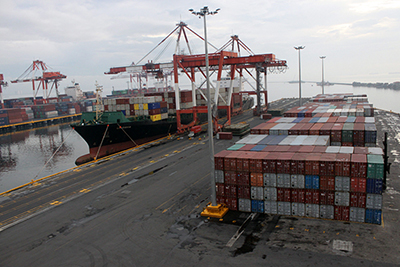-
Business groups supported a proposed bill that aims to strip the Philippine Ports Authority of its mandate as a revenue generator
-
House Bill No. 1400 confines PPA solely to its role as public port developer and operator
-
Philippine Chamber of Commerce and Industry, Philippine Exporters Confederation, Inc. and Supply Chain Management Association of the Philippines threw their support to the measure, which seeks to “decouple” the conflicting regulatory and commercial functions of the PPA
Business groups have expressed support for a proposed bill stripping the Philippine Ports Authority (PPA) of its mandate as revenue generator and confining its role to a public port developer and operator.
In a joint letter, the Philippine Chamber of Commerce and Industry (PCCI), Philippine Exporters Confederation, Inc. (PHILEXPORT), and Supply Chain Management Association of the Philippines (SCMAP) said they support House Bill (HB) No. 1400, which aims to “decouple” the conflicting regulatory and commercial functions of the PPA, according to Philexport News and Features.
READ: House bill seeks to strip PPA’s regulatory power
There is a long-running industry clamor to separate the two PPA functions. Stakeholders claim the apparent conflict of interest presented by these two functions has caused a increase in cargo-handling rates that has eroded the country’s competitiveness.
HB 1400, also known as the Philippine Ports Corp. (Philports) Act, seeks to avoid such conflict, according to bill author Bagong Henerasyon Party List representative Bernadette Herrera-Dy.
“This Act separates the regulatory and development functions of the Philippine Ports Authority (PPA) by converting it into a corporation solely for commercial and development purposes and transferring its regulatory functions and powers to the Maritime Industry Authority (MARINA),” the bill, filed on July 6, 2022, states.
“Under no circumstance should a regulatory agency benefit from its own regulation and/or use its regulatory powers to protect itself from competition at the expense of public interest,” Herrera-Dy said in the bill’s introduction.
Aside from backing the proposed measure, the joint letter—signed by PCCI president George T. Barcelon, PHILEXPORT president Sergio R. Ortiz-Luis Jr., and SCMAP president Pierre Carlo Curay—also favors a revisit of how ports are managed and regulated as recommended in the 2017-2022 Philippine Development Plan (PDP).
The PDP suggests separating the regulatory and operational functions of port authorities and establishing a single entity to regulate ports in order to increase their efficiency and competitiveness by allowing inter-port competition and encouraging more private sector participation.
This policy reform will address not only the conflict of interest, but more importantly, the “competitive neutrality” issue hounding the port authority, the joint letter said. Competitive neutrality recognizes that significant government business activities in competition with the private sector should not have a competitive advantage or disadvantage simply by virtue of government ownership and control.
In PPA’s case, the competitive neutrality issue centers on its power to regulate against competition to protect its commercial interest, sometimes at the expense of public interest.
According to industry expert Dr. Enrico L. Basilio, Philippine ports have seen a “systematic increase in cargo-handling rates happening over the years and extending even through the pandemic.”
This, he said in a talk last year, has led to the Authority generating a lot of income, which has been outstripping expenses in port operation, maintenance and development, with the situation effectively becoming a tax burden for port users.
As proposed by HB 1400, Philports will be a GOCC attached to the Department of Transportation and mandated to own, develop, manage and operate public ports within the port system of the old PPA.
It will no longer be a revenue generator but a service provider that “shall always give utmost priority and importance to public service delivery and promotion of public interest over commercial/financial profit,” the bill said.
Moreover, Philports shall collect only the port fees and dues duly approved by MARINA, with no share from the cargo-handling revenues of any service providers Philports contracts or from any revenue generated by private commercial ports.
Barcelon, Ortiz-Luis Jr., and Curay also advocate the rescission of Letter of Instruction No. 1005-A, which entitles PPA to a share of 10% to 20% of cargo handling revenues, the rates of which the agency also approves.
“This is a case of the regulator (PPA) benefitting from its own regulation. As a public enterprise (GOCC), PPA remits billions to the Treasury, even during the pandemic when trade was down by more than 30%, but in the process makes the Philippine economy uncompetitive with high port charges,” the business executives pointed out.
The Philippines is said to have the highest cargo handling cost in ASEAN, which undermines its global competitiveness.





